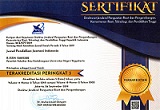Physical activity motivation as predictors of body mass index and fitness: A cross-sectional study
Downloads
Abstrak: Penelitian ini bertujuan untuk menganalisis pengaruh motivasi aktivitas fisik terhadap IMT dan kebugaran jasmani siswa. Desain penelitian menggunakan pendekatan kuantitatif cross-sectional. Populasi penelitian diambil dari SMA di Kota Surabaya dengan jumlah sampel sebanyak 66 siswa yang dipilih secara purposive sampling. Data dikumpulkan melalui kuesioner motivasi aktivitas fisik (RM4-FM) serta pengukuran langsung terhadap IMT dan kebugaran jasmani menggunakan instrumen dari kemenpora yaitu Tes Kebugaran Pelajar Nasonal (TKPN). Analisis data dilakukan melalui statistik deskriptif, uji asumsi klasik, dan regresi multivariat (GLM Multivariate) dengan bantuan perangkat lunak SPSS. Hasil penelitian menunjukkan bahwa motivasi berpengaruh signifikan terhadap IMT (F = 9,681; p = 0,003; R² = 0,131) dan kebugaran jasmani (F = 6,089; p = 0,016; R² = 0,087). Uji multivariat (Pillai’s Trace = 0,131; F = 4,765; p = 0,012) juga mengonfirmasi bahwa motivasi secara simultan memengaruhi kedua variabel dependen. Dengan demikian, motivasi terbukti berperan penting dalam menjaga IMT yang seimbang serta meningkatkan kebugaran jasmani siswa melalui aktivitas fisik yang teratur. Temuan ini memberikan implikasi bahwa peningkatan motivasi dapat dijadikan strategi penting dalam program pendidikan jasmani dan intervensi kesehatan sekolah untuk mendukung gaya hidup aktif pada remaja.
Abstract: This study aims to analyze the effect of physical activity motivation on BMI and physical fitness of students. The research design used a quantitative cross-sectional approach. The study population was taken from high schools in Surabaya City with a sample of 66 students selected by purposive sampling. Data were collected through a physical activity motivation questionnaire (RM4-FM) and direct measurements of BMI and physical fitness using an instrument from the Ministry of Youth and Sports, namely the National Student Fitness Test (TKPN). Data analysis was carried out through descriptive statistics, classical assumption tests, and multivariate regression (GLM Multivariate) with the help of SPSS software. The results showed that motivation had a significant effect on BMI (F = 9.681; p = 0.003; R² = 0.131) and physical fitness (F = 6.089; p = 0.016; R² = 0.087). Multivariate testing (Pillai's Trace = 0.131; F = 4.765; p = 0.012) also confirmed that motivation simultaneously influenced both dependent variables. Thus, motivation plays a significant role in maintaining a balanced BMI and improving students' physical fitness through regular physical activity. These findings suggest that enhancing motivation can be an important strategy in physical education programs and school health interventions to support active lifestyles in adolescents.
Downloads

This work is licensed under a Creative Commons Attribution-ShareAlike 4.0 International License.

Jurnal Pendidikan Jasmani Indonesia is licensed under a Creative Commons Attribution-ShareAlike 4.0 International License.
Based on a work at https://journal.uny.ac.id/index.php/jpji.











